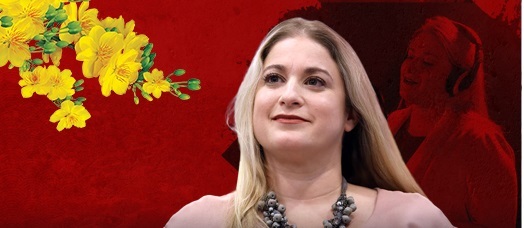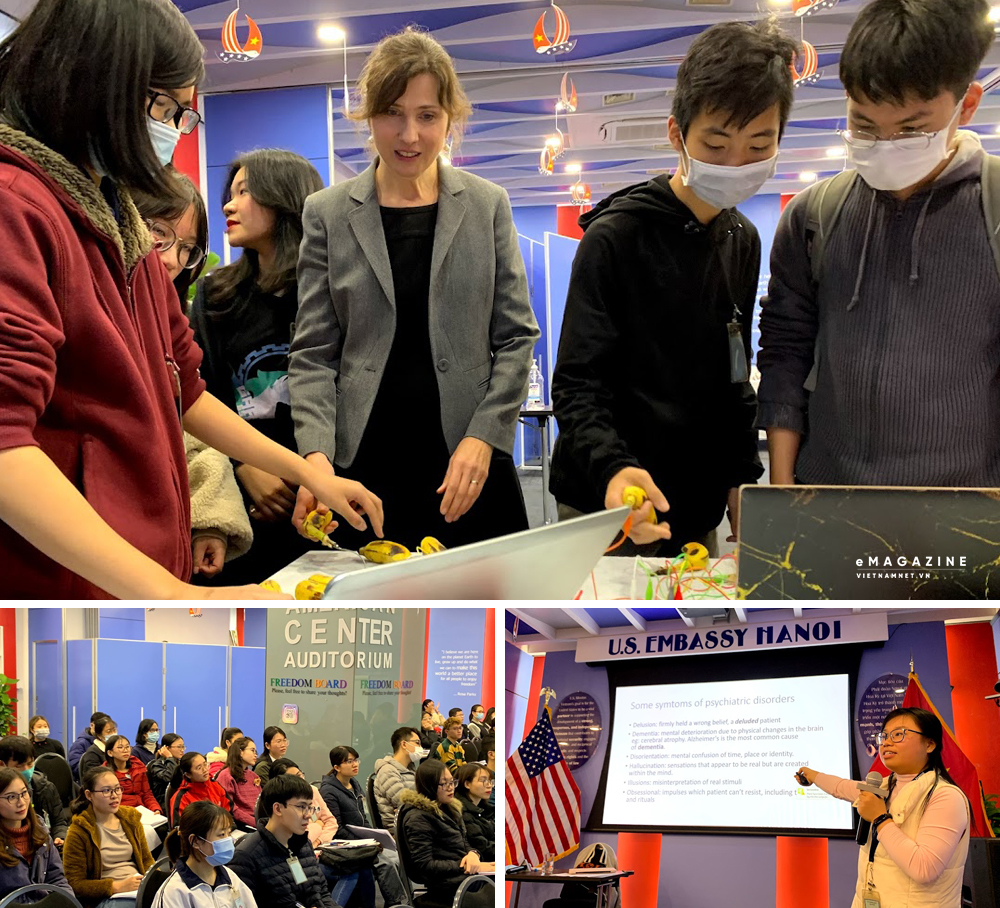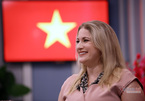When did you first come to Vietnam?
When I first came to Vietnam it was 2017, and I had a good fortune of coming during Tet time. It was a very interesting experience for me. I was able to go to the flower market and see all the beautiful colors and everyone was so active and full of life and it made me want to return to Vietnam, not as a tourist but as a diplomat.
Returning to Vietnam in a new position – US Cultural Attaché – last August, the peak of the Covid-19 epidemic in Vietnam, were you worried?
When I came back to Vietnam it was definitely a complicated time. We all know that Covid is everywhere, every country in the world has faced challenges with Covid. For me, I was very excited to come to Vietnam with my husband and my two small children and the longer we stay here the more we come to love this country. I’m really glad that we came.
 |
|
|
Before coming to Vietnam, did you study the Vietnamese language?
Yes, I actually studied Vietnamese for six months before I came to Vietnam, and I’m continuing to study now. I have a teacher and we meet regularly because (speaking in Vietnamese) “Vietnamese is a very difficult language”. So it’s important to keep learning and keep practicing.
You have been studying Vietnamese language for only six months, but you have been able to communicate very fluently. Do you have any secret?
Vietnamese grammar is very challenging. In my life and career so far I’ve studied five different languages and I believe Vietnamese is the hardest, but it is definitely worth learning because it is a beautiful language; and the people here really appreciate when you speak Vietnamese to them, so I’m trying to learn.
My best advice for anyone learning Vietnamese or any language it’s just to immerse yourself and spend time speaking with native speakers. I try to speak with taxi drivers, I try to talk to somebody selling me Banh My, I try to speak it with my colleagues in the office, and just little by little become more comfortable. I think that’s the best way to learn a language. But these days we have an advantage with so much technology available. We can watch foreign language films online, we can listen to podcasts,…
I know the US government has a lot of free resources available for people who want to learn English, so I always encourage people to just look and you’ll find something great.

You sang very well a Vietnamese song entitled "Bui Phan" (Chalk Dust) on the occasion of November 20, 2021 - the Vietnamese Teacher’s Day. Many people shared this clip as a congratulation to their teachers and their children’s teachers. Why did you choose this song?
I actually didn’t know much about Vietnamese Teachers’ Day before I arrived in Vietnam. And when I came to my office, I was speaking with my colleagues and they explained to me how important the day is in Vietnam. So, we decided, ‘wow, we should really do something special for teachers, we should give them a small gift from us at the Embassy’, and so we decided something emotional and nostalgic would be nice for teachers to show them that we care. So, we decided to choose this song.
First, I had to spend a lot of time reviewing this song and understanding the words, because as a foreigner I didn’t know the word for ‘chalk dust’ in Vietnamese, it’s not a common expression. So I sat with my teacher, she explained all of the different terms and she gave me the image of a teacher with chalk dust in their hair, …
That was a nice experience singing this song about teachers with my teacher. And then after that we went to a recording studio and I had my music teacher help me work through singing and how to find the rhythm because I’m not professional singer. It took a couple weeks, and definitely a lot of time studying the words.
I would try to sing something and they would say ‘uhm… not like that’, so I would try again and again, and finally we could do it. I think everyone values their teachers around the world, especially here at the Embassy.
We want to show Vietnam that we believe that Vietnamese teachers are very special. In fact, we have a lot of programs that we try to run from the Embassy to support teachers, especially those involved in English language learning.
For example, we have one program where we bring American teachers over to Vietnam to work directly with Vietnamese teachers and students in universities.
This is, for many students, the first opportunity they’ll ever have to connect with a native speaker. And we do this programming in provinces across Vietnam, not just in the capital city.
As we all know, language learning is much easier when you’re younger, so we have another program called Access, which, since 2009, has trained more than 1000 Vietnamese high school students in English for two years and they end up being able to continue using English for the rest of their lives.

Coming to Vietnam as a cultural attaché not long ago, you are quite knowledgeable about Vietnamese culture. What are the recent notable milestones of Vietnam-US’ cultural cooperation? How do you plan to promote cultural ties in the near future?
In the past 25 years, Vietnam’s relationship with the United States has just continued to get stronger and deeper. I think cultural cooperation is no exception to that. We’re always finding new ways to cooperate with the Vietnamese government, non-governmental organizations, and with the people of Vietnam.
One initiative that we’re really proud of is the Ambassador’s Fund for Cultural Preservation, which, since 2001, has had more than 1.2 million USD worth of funding for 16 projects across Vietnam. The purpose of this initiative is to preserve Vietnamese culture: Vietnam has a very rich, diverse, and important culture and history.
The US government is proud to partner with Vietnamese institutions in protecting and preserving that culture. We’ve had projects like preserving a 14th century citadel from the Ho Dynasty in Thanh Hoa province. We’ve had projects preserving the traditional Then music in Cao Bang province. The projects have spanned across the whole country, and we’re hoping to do more in the future.
Speaking of the future, I think it’s also important to not just look behind us but look at what comes ahead. One area that we’re really excited to focus on for the next year is training, equipping, and encouraging the next generation of Vietnamese young people to participate in this increasingly globalized world.
At our American centers in Hanoi and HCM City, we have programs for STEM and robotics to prepare young people for careers in the fields of science. We have English programs for specific purposes: whether you’re wanting to be a doctor, or you’re wanting to be an entrepreneur, you can learn English tailored to those fields. We have programs to prepare people with job skills for job markets like public speaking. All of these programs are free and open to the public so we’re really excited to see 2022 and what new initiative will come this year.
Thai An - Xuan Quy

The US Embassy attaché performs Vietnam's "ve singing"
Kate Bartlett is the Cultural Attaché of the US Embassy in Hanoi. She can speak five languages: Spanish, Indonesian, Romanian, Iranian and Vietnamese.